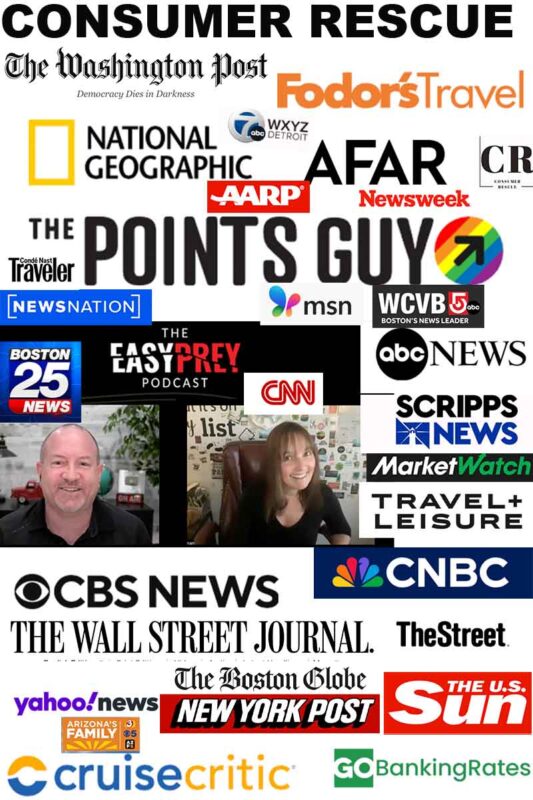All types of Zelle scams are reported to the Consumer Rescue advocacy team every week. Blindsided victims reach out to us, minutes too late – after they’ve sent their cash to cunning thieves through the instant money transfer app.
And although Zelle scams are a common theme with consumers who fill out our help form, it’s rare to hear from the thieves themselves. In fact, it’s unheard of.
That is, until this week. That’s when a criminal called me posing as a Bank of America executive. He tried his best to scam me into using Zelle to fix a problem he said the bank had detected.
Unaware that he was wasting his time having reached a consumer reporter who has covered Zelle scams in depth for years, he went on and on. I wanted to learn more about his scheme. So, I let him talk and allowed him to believe he had me on the hook so I could gather information about his particular con game.
Here’s my interview with a Zelle scammer.
“I’m calling about your Bank of America account.”
As I was busy answering consumer questions one afternoon this week, my phone rang. The caller ID showed the number as 1-800-432-1000, but identified it as an “Unknown” source which I found odd before I even answered.
Michelle: “Hello, Michelle Friedman.”
Zelle scammer: “Hello, Ma’am. I’m calling from Bank of America. There is a problem with your account”
MF: “Oh, I think you have the wrong number. I don’t have an account with Bank of America.”
Faced with this information, the scammer immediately readjusted his script.
“Someone opened a Bank of America account in your name.”
Now the scammer introduces the Zelle component, first explaining that Bank of America has inexplicably allowed someone to open a bank account in my name.
ZS: “Yes, I know. Someone opened a Bank of America account in your name yesterday using your social security number. We have a serious problem that we need to address immediately. Are you familiar with Zelle?”
MF: “How would someone open a bank account in my name without me there? That seems like an impossibility.”
ZS: “It was probably a loved-one of yours. Well meaning — but there is a problem that we have to stop right away. What do you know about Zelle?”
MF: “A loved one opened a bank account in my name? Why would they do that? How strange…”
ZS: “Yes, with your social security number. Now ma’am, there are two pending Zelle transfers that we need to stop or you will lose a lot of money. They are coming from that new account into your actual bank account with your name and your social security number attached. If we don’t reverse them now, you will lose all the money. They are coming from your actual Zelle account.”
Even I couldn’t follow this guy’s sequence of events. It made no sense, but we continued with our conversation.
MF: “Oh, no worries. I don’t have a Zelle account. I really think you have the wrong person.”
Trying hard to pull a Zelle scam on a consumer reporter
ZS: “No, I don’t have the wrong person. Am I speaking to Michelle ‘Fried’ man? We really don’t have a lot of time to fix this.”
The scammer mispronounced my name as someone who might not be familiar with the English language. But I was more curious than ever how this sloppy Zelle scam attempt could possibly lead to cash in this guy’s pocket.
MF: “So you’re saying that someone – maybe a loved one – opened a Bank of America account in my name and put money in the account, too? Wow! And now that loved one is making Zelle transfers using that money? Why doesn’t Bank of America just shut down the account and take care of this without me? What do you need me for? I’m not your customer.”
ZS: “You’re not taking this seriously and we are trying to help you. You’re going to lose a lot of money if you don’t follow my instructions. Your social security number is tied to all of this.”
MF: “Okay, what are your instructions?”
ZS: “Thank you. You’ll create a Zelle account which I’ll help you do. Then I will give you a code and you will reverse these Zelle payments using that code.”
Fact: You can’t cancel a Zelle payment
MF: “Aren’t Zelle transactions instant and not reversible? This sounds unusual.”
ZS: “Yes, they usually are, but because we suspected these Zelle transfers were fraudulent we held off on paying them. Only with this special code that I’m going to give to you will you be able to reverse these Zelle payments — otherwise you will lose all the money. So, what is your regular bank?”
MF: “You want me to give you my actual bank information? If you are with Bank of America and you see the pending Zelle transfers, you must be able to see my bank information. Why do I need to tell you my banking details?”
ZS: “I don’t have all the details. Those are private. But if you give me your bank information, I can help you set up your Zelle account. We won’t store it. You’ll reverse the Zelle transactions from your bank back to this fraudulent account and then we’ll close that account. I will delete your bank account information after that — we won’t store it. But we must do this quickly. Time is running out.”
Huh? It seemed like it might be this Zelle scammer’s first day on the job. His spiel was so awkward and nonsensical that I wondered if this script had ever worked on anyone.
But then I thought about all the consumers who have reached out to our team over the years who have fallen victim to various Zelle scams.
I could see how someone unfamiliar with Zelle might be frightened into following this scammer’s instructions. Especially since he knew the actual name of the person he was calling.
Time to put an end to this awkward Zelle scam attempt
Now I was angry with this scammer on the other end of the line. Since I had other work to do, it was time to put an end to this nonsense.
MF: “Listen, you don’t have my social security number, nor did anyone set up a bank account in my name. You don’t work at Bank of America. You are a common thief. I think you should be ashamed of yourself. I’m very familiar with Zelle and these scams. I’m a reporter and I’ve covered this topic many times to warn people about con artists like yourself.”
And with that, the scammer breathed a loud and angry sigh into the phone and hung up on me. His scheming plans, at least for me, foiled.
But what about the next person he called?
That thought really bothered me.
How to avoid becoming a victim of this Zelle scam
Unfortunately, I know that this telephone predator likely had a long list of names and numbers to cold call with his Zelle scam. Our interaction was just a brief distraction from his schemes. He was probably on the phone within minutes of hanging up on me offering his “help” to another potential victim.
Here’s what you need to know about avoiding Zelle scams.
- Zelle payments aren’t reversible: Despite what this scammer told me, you can’t reverse Zelle payments. These are instant, bank-to-bank transfers. So after a customer authorizes the Zelle transaction they can’t call it back. The entire premise of this predator’s call was based on something that isn’t possible. Don’t let a caller trick you into thinking a special code can reverse a Zelle transaction… it isn’t possible.
- Hang up on scammers: If you receive a call from someone who says they are from a bank and the only solution to a serious problem is for you to create a Zelle account and start making transfers – hang up! This is a scam 100 percent of the time. No real bank will ever call and offer to help you set up a Zelle account to fix a problem – but a scammer will happily hook you up – to his own bank account.
- Don’t be fooled by the caller ID: Scammers can easily spoof any number and make it appear as if you are receiving a phone call from an official number. 1-800-432-1000 is listed as an actual Bank of America phone number. Of course, this Zelle scammer was not actually calling me from that number. Don’t be fooled by the phone number on your caller ID.
- Pay attention to the urgent nature of the call: Predators rely on surprising their victims – sneaking up on them when they least expect it. This is a fact across the animal kingdom. Scammers need to conduct their business quickly before you catch on. In the phone call with this Zelle scammer, he repeatedly warned me that time was running out. This type of language is meant to create a sense of urgency and anxiety, which can lead to disarming the victim and cause that person to do something they would not do without that type of pressure. This behavior is the hallmark of a scam. So, don’t be intimidated by an anonymous person on the phone warning you that time is running out if you don’t do as they say. Hang up and call the bank directly – use the number on the back of your debit card.
- Don’t be worried that the scammer has your name: In today’s world, there is very little privacy. You may not know it, but your name, address, phone number and other personal details are readily available on the internet. Determined scammers gather this information and create cold call victim lists in an effort to bolster their schemes. Don’t be worried if the scammer uses your name in the conversation – just hang up.
- Only send Zelle payments to people you know personally: Zelle is meant to send cash to friends and family. It is not meant to buy pets from strangers, pay anonymous vendors for office supplies for your new job, buy items from strangers on Facebook Marketplace, or assist a bank with fixing a problem it has detected. If you only send Zelle payments to people you know in real life and make certain you double and triple-check the number so you don’t send your money to the wrong person, you’re unlikely to ever become a victim of a Zelle scam. (Michelle Couch-Friedman, Consumer Rescue)
Before you go: Unfortunately, sometimes these crooks don’t even have to make a cold-call. Scam call centers are invading the Internet search results. Here’s what you need to know to spot and avoid these scammers.


